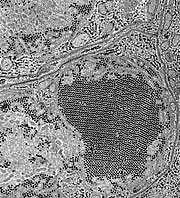When the City is the Disease
Bill Radke
Millie Jefferson
JUNE 14, 2008
- St. Louis encephalitis
- (Centers for Disease Control and Prevention)
- Enlarge This Image
Related Stories
More From Bill Radke
More From Millie Jefferson
This weekend, researchers are focusing on tomatoes grown in Florida and Mexico in their hunt for the source of a salmonella outbreak that has made 228 people sick in 23 states.
The specific strain is called Salmonella St. Paul -- that's because it was first identified in St. Paul, Minn., in the 1940s. A writer for the St. Paul Pioneer Press complained about the disease's name: "Who wants to be associated with diarrhea, fever and abdominal cramps? Isn't Minneapolis available for that?"
The fact is, naming the disease after a location happens a lot, and sometimes it can cause problems. Joining us is Dr. Larry Altman, medical correspondent for the New York Times:
Bill Radke: Dr. Altman, welcome to Weekend America.
Dr. Larry Altman: Thank you.
Radke: Some diseases are named after places, some are not. Who decides that, and how?
Altman: There's no short answer that I know of. They can be named for a geographic location for the discoverer who first reported the disease. It can be named after patients who had it. There's Christmas Disease -- it's mistaken for hemophilia, people think its because it was discovered at Christmas time, but it wasn't. It was simply named after the first sufferer, which was a boy named Christmas.
There are committees that meet and formalize the names, but they only meet every five or so years, and by then the names are often ingrained. I'm sure Legionnaire's Disease [was decided] before committees met.
What are some other towns that are unlucky enough to have lent their names to diseases?
Coxsackie is one, in upstate New York where the virus was isolated. There are hundreds of salmonella subtypes and many of them are named for geographical locations. You get lyme disease for a town in Connecticut, even though the disease was known in Europe many years before. There's junin virus, which occurs in Argentina, then you have ebola, marburg -- they're all named by the scientist who discovered them and they were given, in essence, a scientific nickname.
What problem does it cause when a disease is named after one place, but it actually can appear lots of places?
That's a particular problem -- Rocky Mountain spotted fever is a good example of that. The agent was isolated from ticks in the Rocky Mountain area originally, but then it was discovered years later that the same agent was being transmitted by ticks in the East. It gets into a situation where you think that a disease may be limited to one local when it may be much broader in terms of the areas where it occurs.
You wrote some 20 years ago that doctors would talk regularly at one symposium after another about how we really have got to do something about this naming convention. Has that problem been solved? Have we figured out a better way?
Not that I know of. It's still lyme disease for that one. I think once it becomes convention, it's very hard to remove it from everyday usage. It's like everything else in life -- the habit forms and it's difficult to undo it.
Dr. Larry Altman, thank you so much.
You're more than welcome.
-
- Music Bridge:
- Last Beat
- Artist: NOMO
- CD: Ghost Rock (Ubiquity)







Comments
Comment | Refresh
Post a Comment: Please be civil, brief and relevant.
Email addresses are never displayed, but they are required to confirm your comments. All comments are moderated. Weekend America reserves the right to edit any comments on this site and to read them on the air if they are extra-interesting. Please read the Comment Guidelines before posting.
You must be 13 or over to submit information to American Public Media. The information entered into this form will not be used to send unsolicited email and will not be sold to a third party. For more information see Terms and Conditions and Privacy Policy.